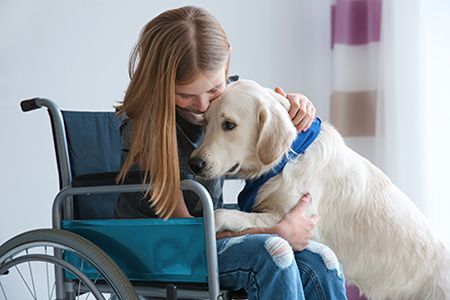Service dogs benefits transcend physical assistance, study finds
Purdue veterinary researchers document service dogs impact on psychosocial health of recipients, family members.
Africa Studios/stock.adobe.com

The Purdue University College of Veterinary Medicine presented research findings recently indicating that service dogs may have measurable effects on the psychosocial health of people with physical disabilities or chronic conditions.
The study, funded by Elanco Animal Health, used standardized measures to examine the relationship between the human-animal bond and psychosocial outcomes among people with service dogs. Results were published in the January 2019 issue of Disability and Rehabilitation, in addition to being presented at the VMX conference in Orlando in January.
Service, therapy, emotional support: Do you know the difference?
Here are some facts about the different kinds of dogs (and other animals) that provide aid to humans, as presented by human-animal bond researcher Maggie O'Haire, PhD, of Purdue University. Bet some of them are news to you!
- Therapy animals provide emotional support to many people in a specific setting (hospital, school, nursing home and so on).
- Emotional support animals help specific individuals.
- Service dogs perform tasks related to a patient's disability.
- Only service dogs can legally go anywhere.
- Emotional support animals can live in “no pets allowed” residences and travel in the passenger cabin on airlines, but airlines have size restrictions, and some now have species restrictions.
- Only therapy animals have a national registration/certification system and there are species restrictions-dogs and miniature horses only.
- Service, therapy and emotional support animals do not have to wear vests; none are legally required to be professionally trained.
- Only service dogs must abide by behavior standards.
“Our goal was to apply strong science in quantifying the effects that these dogs can have on their handlers' well-being,” says Maggie O'Haire, PhD, associate professor of human-animal interaction at Purdue, in a release from Elanco. O'Haire led the research along with Kerri Rodriguez, a graduate student in human-animal interaction.
It may seem like common sense that a service dog would boost the emotional and social support, self-esteem and confidence of its owner, who is likely someone with a socially challenging condition such as cerebral palsy or muscular dystrophy. But evidence-based studies showing these psychosocial benefits have been weak, O'Haire told the audience at VMX. “After conducting our background research, we realized that the benefits of the bond were a hypothesis to be confirmed rather than an established fact,” she said.
Plus, as the demand for service dogs increases-there were almost twice as many assisting people in 2017 (19,144) as in 2009 (10,769), according to Assistance Dogs International-strong scientific support is necessary to help manage recipients' expectations, enhance and maximize service dog benefits, boost recognition of the value of service dogs to insurance companies, and increase service dog access and public understanding of their roles, O'Haire said.
So Elanco and Canine Assistants, an organization that provides service dogs for a variety of physical conditions and disabilities, teamed up with the Center for the Human-Animal Bond at Purdue University College of Veterinary Medicine to quantify the impact of service dogs on patients' psychosocial health. Researchers recruited 154 individuals to participate in a cross-sectional survey, including 97 placed with a mobility or medical service dog and 57 on the waitlist to receive one (the control group).
Results showed that recipients with service dogs had significantly higher psychosocial functioning (social, emotional and work/school function) than the control group, but there were no significant differences in sleep, anger or social companionship. The recipients were all highly bonded with their dogs over the entire study period-the bond did not diminish over time.
In addition, the open-ended questionnaire revealed that psychosocial benefits were greater than the physical task-related benefits, and that the drawbacks to service dog ownership were public education and access, lifestyle adjustments, and dog care and behavior.
Results showed that before acquiring a service dog, 22% of recipients anticipated that public education/awareness about service dogs and their rights related to access would be a drawback, but that after acquiring a service dog, 44% of recipients reported this as a drawback.
O'Haire admitted that some of the results were surprising, such as the absence of a measurable benefit for social companionship associated with owning a service dog. But the fact that results were not positive across the board were evidence of the study's reliability, she said. “If we had seen a correlation in every category, we might have suspected our study design,” she said.
Caregivers in the households of the people served by the dogs were also part of the study, and their results reflected the same effects-they reported significantly higher psychosocial functioning on the part of the recipients but no significant differences in sleep, anger and social companionship. Caregivers with service dogs also had better family relationships and less worry about the recipients' health.
